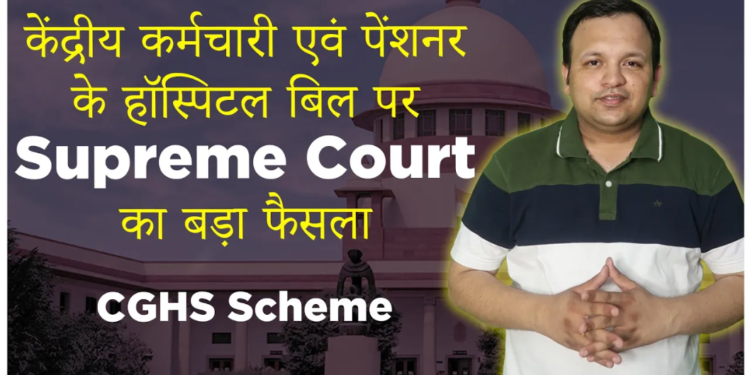Introduction-
Taxation is a way for us as citizens to support our government’s operations. In return, we expect certain services, with access to proper healthcare being one of the most essential. When our health is at risk, it is the government’s duty to ensure we receive necessary care. This is where healthcare schemes like the Central Government Health Scheme (CGHS) come in, providing medical coverage to government employees and pensioners.
To learn more about the topic, read the blog till the end, and if there lies any more doubt, feel free to reach out to us at; https://thelegalshots.com/legal-opinion/
To delve into the details of a recent landmark judgment regarding the CGHS scheme, we’ve created a special video. We’ll explore its implications, outline the steps to avail insurance benefits from central and state governments, and discuss the CGHS scheme’s eligibility criteria.
The Supreme Court’s recent ruling regarding the CGHS scheme has significant implications. It clarifies whether individuals can claim insurance benefits when receiving treatment at hospitals not empanelled with the government or in cities not covered by the scheme.
What is CGHS ?
The CGHS, initiated by the Central Government, provides comprehensive medical coverage to employees and retired pensioners. Eligibility criteria encompass various categories, including central government employees and their dependents, and certain autonomous organization employees.
Who is Eligible for a CGHS Card?
- All Central government employees and their dependents.
- All Central government pensioners and their dependents.
- Sitting and Ex-Members of Parliament.
- Ex-Governors and Lt. Governors
- Freedom Fighters
- Ex-Vice President
- Sitting and Ex-Judge of Supreme Court and High Court
- Employees and Pensioners of Certain autonomous organizations in Delhi
- The Journalist in Delhi accredited with PIB
- Delhi Police Personnel
- Railway Board Employee
Case Shiva Kant Jha vs. Union of India, 13th April 2018
Brief Facts of the Case-
The petitioner faced heart issues and was admitted to Fortis Hospital. The doctor prescribed a certain device costing Rs. 9,86,000/-. Later, he faced more health issues and was admitted to Jas Lok Bhoomi Hospital, costing him around Rs. 3,00,000/-. The total cost of his treatment was Rs. 13,86,000/-. Being a central government employee with a CGHS Card, he sought reimbursement from the government. However, his claim was rejected by the committee, and subsequent appeals were also denied. The department cited two reasons for rejection: failure to seek authorization for the implanted device and treatment at a non-empanelled hospital.
He appealed to the Director General of the CGHS, who partially reimbursed Rs. 5,80,000/-, but rejected the rest. Aggrieved, the petitioner approached the Supreme Court under Article 32 of the Indian Constitution, arguing violation of the Right to Health and his eligibility for CGHS benefits. The Supreme Court directed the department to grant Rs. 3,00,000/- to the petitioner, with further proceedings pending.
Supreme Court Judgement-
The Supreme Court’s ruling in Shiva Kant Jha vs. Union of India, 13th April 2018, emphasizes the importance of following doctors’ prescriptions for medical procedures. Reimbursement depends on medical necessity certified by a Doctor, regardless of treatment location or hospital empanelment. This verdict benefits individuals like Shiva Kant Jha and empowers all employees and pensioners seeking government reimbursement.
Conclusion-
Taxation is the means through which we contribute to the functioning of our government, expecting services in return, such as access to proper healthcare. The recent Supreme Court judgment regarding the Central Government Health Scheme (CGHS) highlights the importance of adhering to doctors’ prescriptions for medical procedures. This ruling has significant implications, ensuring that individuals can claim insurance benefits even when receiving treatment at hospitals not empaneled with the government or in cities not covered by the scheme. The CGHS, designed to provide medical coverage to government employees and pensioners, plays a crucial role in ensuring healthcare access. This judgment not only benefits individuals like Shiva Kant Jha but also empowers all employees and pensioners seeking government reimbursement, emphasizing the right to health and eligibility for CGHS benefits.
To understand more such complex law in simple ways, stay connected with www.thelegalshots.com .
If doubts still persist, contact our Legal Experts at https://thelegalshots.com/legal-opinion/




